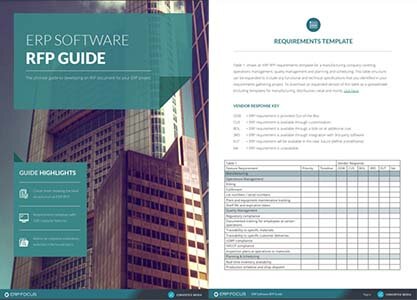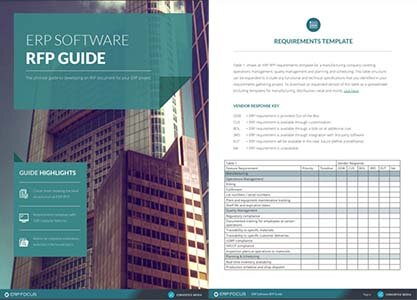7 core features in mobile ERP applications
Mobile ERP applications have evolved significantly from their genesis as a simple remote POS, or distributed inventory transaction tool. Today, a range of mobility-adept ERP systems offer hosts of sophisticated features that make them much more than just a one trick pony. Here are some of the core mobile features that currently exist in the ERP market.
1. Application security
As smart devices have become more plentiful in ERP usage, the numbers of sophisticated data hacks have also multiplied. In response, ERP developers, mobility providers, and security professionals have worked together to deliver various firewall systems that have largely marginalized remote data-derived security threats. Having said that, core security features such as role-based access and device registration are essential.
2. Real-time remote access
Before mobility, there was client server; and prior to that there was distributed computing. When considering these three communications architectures overlaid with the needs of universal ERP data management, only mobile provides real-time remote operations. This real-time data delivery obviously requires an internet connection, so couple this with offline access and data synchronization, and you have a powerful application for remote work.
Recommended reading: ERP software RFP guide - learn how an RFP document can help you communicate your mobile ERP requirements to vendors
3. Global project management
In the same way that mobile enterprise interoperability provides value, the global delivery of synchronized project data applies as well. As a result, most, if not all mobility-adept ERP platforms offer real-time, remotely synchronized, project management capabilities in order to round-out necessary operating values.
4. Mobile API
Today’s ERP platforms accept that information customization is central to all viable data-derived systems. As mobility has emerged as a central communications value, API’s have also evolved apace, allowing extended API’s and subordinate mobile applications to expand transparently.
5. Intrinsic geo-location
One of the more innovative elements associated with mobile ERP applications is the ability to manage operations virtually, anywhere in the world, any time. As an additional advantage, then, mobile ERP systems harbor fundamental geographical information that can be immediately integrated and leveraged within global operations. These features are particularly useful in the transportation and distribution industry.
6. Universal document publishing
Similar to the advantages offered by mobile project management, today’s ERP systems can offer universal document publishing regardless of their location or systems time.
7. System-wide communications tools
Mobile ERP applications are driven by universal operations and supported by real-time data. Therefore, part of their value resides in an ability to deliver point-to-multi-point communications. This includes all administrivia associated with an ERP platform, whether it is a simple utility update, or the global refresh of a particular network’s universal business rules.
As suggested earlier, these are only a few of the many features associated with today’s mobile ERP applications. But these list items represent some of the more obvious, and useful, in today’s ERP system market.
Free white paper

ERP Software RFP Guide & Template
The comprehensive guide to developing an RFP document for your ERP project

Related articles
-
![Mobile ERP case studies you can learn from [Image by javi indy on Freepik] Mobile ERP case studies you can learn from [Image by javi indy on Freepik]](/pictures/W1siZiIsIjIwMjQvMTAvMTYvejB2YnNremFyX01vYmlsZV9FUlBfY2FzZV9zdHVkaWVzX3lvdV9jYW5fbGVhcm5fZnJvbV9JbWFnZV9ieV9qYXZpX2luZHlfb25fRnJlZXBpa18uanBnIl0sWyJwIiwidGh1bWIiLCI0MDB4MjY2IyJdLFsicCIsImVuY29kZSIsImpwZyIsIi1xdWFsaXR5IDg1Il1d/Mobile%20ERP%20case%20studies%20you%20can%20learn%20from%20%5BImage%20by%20javi%20indy%20on%20Freepik%5D.jpg?sha=d39d01df11779155)
Mobile ERP case studies you can learn from
Learn how mobile ERP has benefited three businesses...
-

Secret KPI: Why Your ERP Implementation Team Matters More Than Software
Learn how Godlan ensures successful ERP implementation for manufacturers with proven strategies &...
-

4 practical examples of the power of real-time ERP data
Discover the potential of real-time data with these practical examples from a range of industries.

